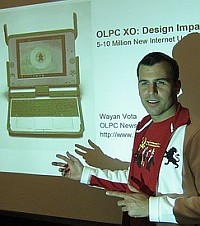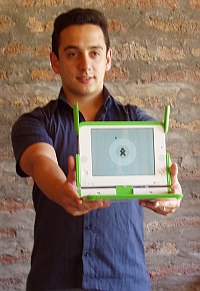Kigali Bottle Cap Golf
After a long day getting the tools of ICT into the hands of those that need them in Rwanda, its time to unwind with a classic local game: Bottle Cap Golf.
Invented by Solar Sam, this game requires more skill and concentration than any simple 18-hole golf course. In fact, its rivals Moto Polo in complexity and difficulty, and is best played under very strict conditions.
Read MoreOLPC News Community of Practice
Recently, I’ve been looking at OLPC News in a whole new light. I’m seeing it as more than just a blog. In fact, when you bring in the OLPC Wiki, I see a three part system that is the community of practice around the One Laptop Per Child program.
First, a definition of a community of practice:
A community of practice is a group of people who share a common passion for a subject and through regular interaction and communication, improve their knowledge and expertise in the topic area. Communities of practice differ from teams and networks in that they are bound by a shared desire to learn, and implement the learning through practice.
I believe that the triumvirate of OLPC News, OLPC News Forum, and OLPC Wiki serve to accomplish four goals typical of a community of practice.
A Bi-Coastal BBQ Lifestyle
Now that I live in Washington, DC and work for Inveneo, based in San Francisco, CA, I am living a bi-coastal lifestyle. I spend an average of a week every month or so in the Inveneo offices, living at the “Inveneo Hotel” – the home of Mark and Kristin, Inveneo’s co-founders.
Before you cringe at the thought of working all day in the same room as your boss and then spending the evenings with him or her too, I have to say that Inveneo isn’t your standard company.
First, we’re a social enterprise, which means we are a 501(c)(3) nonprofit organization, yet we’re run like a business. We’re out there selling product and hustling for business like any other company. At the same time, we have a strong social mission that permeates everything we do.
Directing Inveneo’s ICIP Program

Inveneo ICIP in action
Back when I was Director of Geekcorps, we focused on developing appropriate technology to increase economic development. In the hot, dusty, off-grid environment of Mali, that meant developing solutions like the Desert PC.
While we only built a few for radio stations, another group, Inveneo, took the appropriate computing idea to the next level. They developed an entire product line of information and communication tools for rural and remote communities in the developing world.
But tools themselves are not enough. Technology is only truly sustainable when they are affordable and can be serviced and supported locally and the lack of qualified in-country ICT professionals is a great hindrance to technology diffusion. At Geekcorps we tried to solve this human capacity by linking international technology volunteers with local professionals for one-on-one training.
Read MoreThe Rise of 4P Computing Solutions for the Developing World
Last August, I crowded a few friends into a Japanese restaurant in Silicon Valley to talk about technology in the developing world. Back then, the discussion swirled around One Laptop Per Child, as it was the most visible manifestation of our collective drive to spread appropriate information and communication technology beyond the world’s elite.
That’s because three years ago, Nicholas Negroponte stunned the technology industry and the development community with an amazing idea: One Laptop Per Child – a rugged yet low-cost computing device, the XO laptop, can empower primary education in the developing world.
His idea that low-power, appropriate performance, highly portable, and low-priced computers were not only possible, but could also radically change education in the developing world and computer manufacturing in the developed world was an instant hit with Presidents of the Global South.
While the global telecommunications industry was quick to dismiss his idea as folly, as I told the Economist in its article “The rise of the low-cost laptop“, they did not laugh long:




